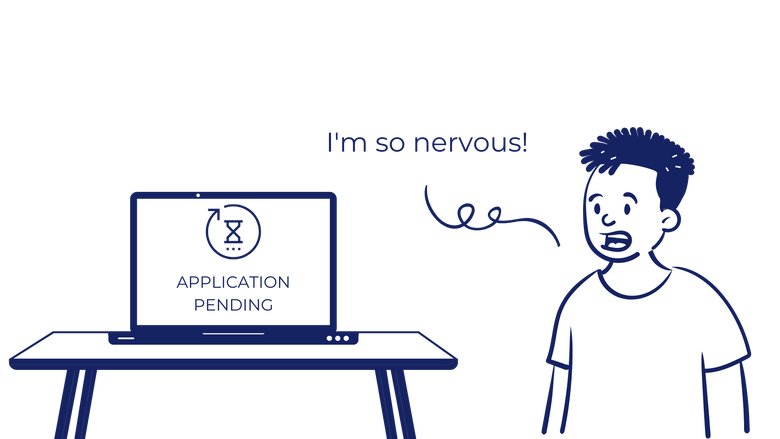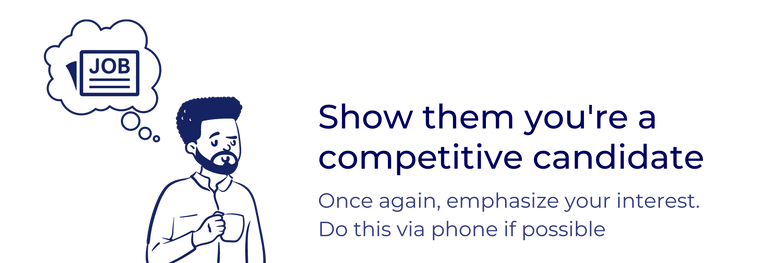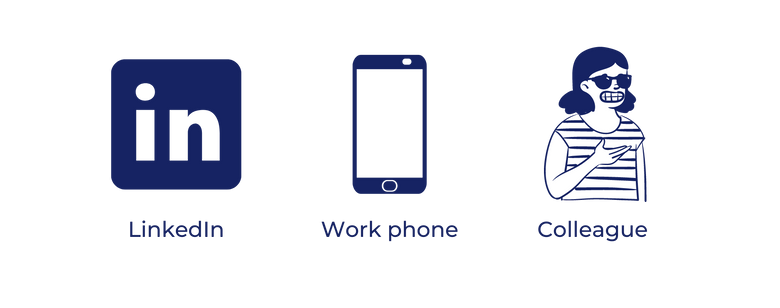8 Job Application Follow Up Emails Recruiters Love
You just finished an interview. How do you make sure you get the role?
You just finished an interview.
You think you did well and you’re excited. You nailed every question, even the whiteboard coding part of the process.
A week passes and you don’t hear back.
Doubt starts creeping in. You’ve progressed in your quest to land a tech role, but the hardest part is yet to come: the waiting game.
How Do I Handle the Waiting Game?

It may seem impolite or pushy to follow-up on a job application, but recruiters actually expect this. A 2017 study from recruiting firm Robert Half showed that 43% of hiring managers expect an application follow-up from candidates in less than two weeks.
So yes, it’s okay to follow-up. As a candidate, your job is to sell yourself, so we can examine sales best practices to learn how to do this right. In sales (and in interviews), not following-up means lost revenue. A report from a research advisory firm shows that it can take as many as 6 call attempts to convert a lead.
Six attempts! And yet many job applicants are afraid to go beyond the first follow-up.
Various reports also show that it takes 5 follow-ups and phone calls after the initial sales contact before a prospect says yes. Unfortunately, a whopping 92% of sales professionals give up only after 4 “no’s.”
Just as those sales professionals would’ve closed a sale if they persisted, you can land a job if you learn how to follow-up on a job application properly.
You just need the right strategy. This is an essential part to succeeding in the interview process.
1. Follow-up when you agreed to during the job interview

There’s a chance the hiring team won’t make up their minds on schedule. Delays happen all the time. It’s up to you to give them a gentle nudge, preferably a day after the agreed follow-up time so you don’t look desperate.
Be careful not to sound like you’re blaming them for the delay. Just say that you’re still interested in the role, then emphasize why you’re a good fit and excited about the team.
Here's an email template to check out:
Checking in
Hi (Their Name),
I hope all is well! I just wanted to check in regarding the status of my application for (Job Title).
You mentioned you were looking to make a decision this week and I wanted to let you know I'm still very excited about the role!
I look forward to hearing back!
Best,
(Your Name)
2. Follow-up when you get a competing offer

The company that interviewed you first won’t always be first in line to extend a job offer.
Either you prefer one company over the other, or you just want to know all your options. Whatever it is, here’s how to follow-up on a job application if you receive a competing offer.
Touching base RE: competing offer
Hi (Their Name),
I hope all is well! Last we spoke, you mentioned that a decision for (Job Title) will be made this week- I'm excited to hear back from the team!
I don’t mean to rush your hiring process, but I’ve just received a competing offer from (Company Name) for a (Job Title) position.
I’m still interested in working with your team, so I’ve held off on deciding until I hear from you. I told the (Other Company) that I'm still waiting for a decision from you.
Do you think you can get back to me with a final answer this week?
I look forward to hearing from you!
Kind regards,
(Your Name)
You don’t want them to cross you off the selection list just because of a competing offer, so tweak the script above. Career experts also recommend to follow-up with a phone call. This way, you’ll get an answer right away and you minimize chances of misunderstanding.
If you can’t reach the contact person after a few calls, use email as a last resort.
3. Follow-up with a Technical or UX Audit

The technical part of the interview gave you a better understanding of the role, so why not use it?
Follow-up on your job application by sending the hiring manager a technical or UX audit, or a pitch deck for a feature.
This strategy requires upfront work but often yields favorable results. Study their app or software— the bugs, interface, available features, and code. Your suggestions should be based on a thorough review of their technology, otherwise it will make you look sloppy.
This follow-up strategy works best for design, growth and product roles.
4. Follow-up using information from the interview

Your resume and cover letter might have all the noteworthy details of your career, but what if you discussed an old project that wasn't listed?
Use this opportunity as a tactical way to stay top of mind.
The project we discussed
Hi (Their Name),
I hope all is well! During my interview last Friday, you asked me about (a specific Github repo, an old app project, app example using Python, etc).
I’ve been digging through my backup files so I can send it to you. Please see attached link/file if you want to take a closer look.
Kind regards,
(Your Name)
Notice that this template doesn’t mention anything about the decision timeline. The mention of your interview is already a reminder that you’re a job applicant waiting to hear back. Your effort to send them the information shows you’re eager for the job.
5. Follow-up by announcing a new certification

Applicants don’t always have all the skills listed on a job description. Your interviewer might’ve brought it up a skill during the interview that you don't possess. But you’re eager to learn about it and build it, through books, small projects, or a larger undertaking.
For example, it's possible you don’t have on-the-job experience with Ruby on Rails, but you’re taking a certification program. Don’t let this accomplishment go unnoticed by potential employers. If your new skills can help with your job, tell them.
How to follow-up on a job application by mentioning new skills:
New Certification
Hi (Their Name),
I hope all is well! I'm reaching out to let you know that I got a certification for (Program or Coding Language) from (Awarding Institution).
I was inspired by our chat and I decided to take this course over the weekend. I think it would help me better fulfill my role as (Desired Position) at (Company Name).
I really enjoyed meeting the team, and my new skill set will make me a strong contributor to their work.
Kind regards,
(Your Name)
6. Follow-Up with Company-Specific Knowledge

Do you keep up with the news about your prospective employers? You should. Google Alerts is a survival tool in startup interviews. Company announcements are a goldmine of information that you can use throughout your job application.
Here’s how to follow-up on a job application after you see some good news about the company:
Congratulations!
Hi (Their Name),
I saw on (Venture Beat, LinkedIn, TechCrunch, etc) that your company (got funding, is launching a new product, etc).
I’m sure you’re excited about the potential growth this brings and I wanted to congratulate you and the team on all your hard work.
I'm even more excited to be interviewing with you now. (Connect it to your job application, role, or the team you will be in).
Kind regards,
(Your Name)
Make sure you read the article thoroughly, not just the headline. You don’t want to congratulate them on something you misunderstood.
There are many ways to connect a news item to your job application. New funding means the company will have more funds for product development, so mention that. Don’t mention your hiring directly, as that might sound tacky.
7. Follow-Up if You’re Not Getting a Response

Sometimes, one follow-up isn’t enough. Here’s how to follow-up on a job application if you didn’t hear back on your last attempt.
Touching base
Hi (Their Name),
Last time we talked, you mentioned there might be an update by (Date). So I was worried that I didn’t hear from you when I followed-up last on (date of your last email).
I’m just checking in to see if the position is still open.
If the role is already taken, would you mind updating me too?
I look forward to hearing back!
Best,
(Your Name)
8. Break Up Email

Things won’t always work out. Either the hiring team is too busy to update you, they went with another candidate, or they decided to postpone the hiring because of another issue.
Whatever the situation is, it’s good to know how to follow-up on a job application and close this part of your job search without burning bridges. In sales, a last nudge like this often works to remind busy people about you. A good subject line is key to capture their attention.
Is the role filled?
Hi (Their Name),
It’s been a while since I heard from you regarding the (Job Title) role.
You might have gone off with a different candidate or maybe your priorities have changed.
Either way, I just wanted to thank you for your time and let you know I really enjoyed the team. Since I didn't hear back, I'll move on to other opportunities. Let's stay in touch if other roles come up that meet my profile/ job description
Thanks for the opportunity and I hope you found the right candidate for the position!
Best,
(Your Name)
Other Methods of Following Up

Try this first. Be sure to add them (or check if you're 2nd level connections) before you send a message. This is the only social media you should use. Do NOT follow up via Facebook, Twitter, or any other social platform.
Work Phone
If you have other contact information, specifically their work phone number, try this next. You can call or text. Some people may prefer text because it's somewhat less intrusive, but use your best judgment.
Another Person
If you were referred, you can also follow-up through that person. Here's how to follow-up on a job application through a referral contact:
Checking in on the referral
Hey (Their Name),
I hope all is well! I was interviewed for the (Job Title) position on (Date). Thank you again for referring me!
The interview went well and I loved chatting with (Interviewer Name) who is the (job title and their role in the hiring committee).
Last we spoke, they said a decision will be made by (Decision Date) but I haven’t heard from them yet. I'm getting a little worried.
Do you know if they’ve picked a candidate yet?
I look forward to hearing back!
Kind regards,
(Your Name)
This follow-up email does two things: it updates the person about your job search and thanks them for referring you. They did you a favor, so it’s only polite to thank them first before you ask for yet another favor.
The Job Search is a Numbers Game
Sales professionals work on multiple leads simultaneously so they have a fall back in case things go south with one deal. Treat your job hunt like this.
Even if you find a job that perfectly matches your skills and desired compensation package, you shouldn’t give up on applying to other companies.
Learn how to follow-up on a job application properly, but don’t obsess over one job opportunity.
Treat your job search like a sales pipeline. Work out how many resumes you have to send to get an interview, and how many interviews lead to jobs.
The information provided herein is for general informational purposes only and is not intended to provide tax, legal, or investment advice and should not be construed as an offer to sell, a solicitation of an offer to buy, or a recommendation of any security by Candor, its employees and affiliates, or any third-party. Any expressions of opinion or assumptions are for illustrative purposes only and are subject to change without notice. Past performance is not a guarantee of future results and the opinions presented herein should not be viewed as an indicator of future performance. Investing in securities involves risk. Loss of principal is possible.
Third-party data has been obtained from sources we believe to be reliable; however, its accuracy, completeness, or reliability cannot be guaranteed. Candor does not receive compensation to promote or discuss any particular Company; however, Candor, its employees and affiliates, and/or its clients may hold positions in securities of the Companies discussed.
